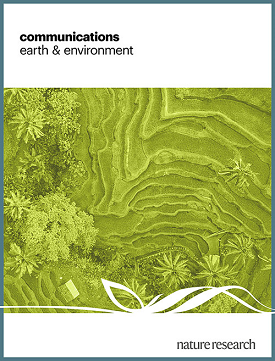Minimum velocity for impact ejecta to form secondaries on terrestrial bodies
IF 8.1
1区 地球科学
Q1 ENVIRONMENTAL SCIENCES
引用次数: 0
Abstract
The minimum velocity (v) for impact ejecta to form secondary craters (secondaries) remains enigmatic, but it is a crucial parameter in untangling the fate of impact ejecta on planetary surfaces. By cataloging the distances (L) of the nearest secondaries from centers of various-sized (D) primary craters (primaries) on the Moon, Mars and Mercury, we find that v can be as small as ~25 m/s, and an unified power-law relationship of L = 1.86D0.93 (both in meters) works for both simple and complex craters, regardless of different surface gravity and target properties. This relationship also successfully predicts occurrences of secondaries formed by craters on Venus. The constraint on v explains the common concurrences of structural disturbances in crater walls and continuous ejecta deposits caused by landing of cogenetic ejecta, suggesting that ejecta forming self-secondaries do not need near-vertical ejection angles and tertiary craters should be abundant on terrestrial bodies. Mapping of the distances of secondary craters from their primary crater on the Moon, Mars, and Mercury indicates a unified power law relationship, regardless of gravity and target properties and suggests the minimum impact velocity is lower than expected.

撞击喷出物在陆地天体上形成次级的最小速度
撞击喷出物形成次级陨石坑(次级)的最小速度(v)仍然是个谜,但它是解开行星表面撞击喷出物命运的一个关键参数。通过对月球、火星和水星上不同大小(D)的主陨石坑(原陨石坑)中心到最近的次级陨石坑的距离(L)进行编目,我们发现 v 可以小到 ~25 m/s,而统一的幂律关系 L = 1.86D0.93(单位均为米)适用于简单和复杂的陨石坑,与不同的表面重力和目标特性无关。这一关系也成功地预测了金星上陨石坑所形成的次级陨石坑的出现。对 v 的限制解释了陨石坑壁结构扰动和同源喷出物着陆造成的连续喷出物沉积的常见现象,表明形成自次级的喷出物不需要接近垂直的喷射角,三级陨石坑在陆地天体上应该非常多。对月球、火星和水星上次级陨石坑与其初级陨石坑距离的测绘表明,无论重力和目标特性如何,都存在统一的幂律关系,并表明最小撞击速度比预期的要低。
本文章由计算机程序翻译,如有差异,请以英文原文为准。
求助全文
约1分钟内获得全文
求助全文
来源期刊

Communications Earth & Environment
Earth and Planetary Sciences-General Earth and Planetary Sciences
CiteScore
8.60
自引率
2.50%
发文量
269
审稿时长
26 weeks
期刊介绍:
Communications Earth & Environment is an open access journal from Nature Portfolio publishing high-quality research, reviews and commentary in all areas of the Earth, environmental and planetary sciences. Research papers published by the journal represent significant advances that bring new insight to a specialized area in Earth science, planetary science or environmental science.
Communications Earth & Environment has a 2-year impact factor of 7.9 (2022 Journal Citation Reports®). Articles published in the journal in 2022 were downloaded 1,412,858 times. Median time from submission to the first editorial decision is 8 days.
 求助内容:
求助内容: 应助结果提醒方式:
应助结果提醒方式:


